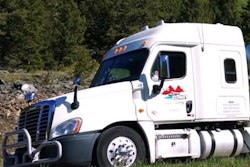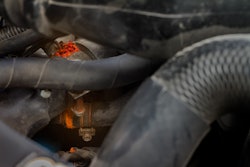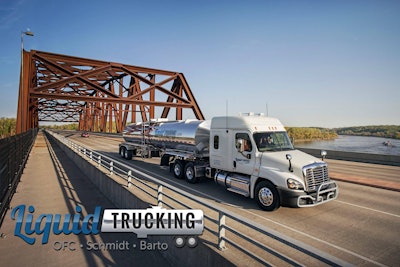 During the COVID-19 crisis, Liquid Trucking’s “fluid” business model has helped it adapt quickly to changing market conditions.
During the COVID-19 crisis, Liquid Trucking’s “fluid” business model has helped it adapt quickly to changing market conditions.Data from a weekly survey conducted by CCJ during the COVID-19 crisis shows the number of carriers reporting a decrease in freight levels has doubled in the last three weeks, with 60% of respondents expecting freight levels to continue to drop over the next 30 days, tying it back to skyrocketing unemployment.
Not all freight markets are down. Some carriers are finding pockets of high demand and adjusting quickly to new market opportunities.
As a tank carrier, Liquid Trucking is “powering through” the COVID-19 crisis, said General Manager Josh Schmidt. The Plattsmouth, Neb.-based company transports all types of bulk liquids, from food and feed-grade products to hazardous materials and chemicals, with its fleet of 180 tractors and 310 trailers.
Before the crisis, the company had a large volume of fuel and ethanol loads. As freight in this sector declined, Liquid Trucking shifted capacity to food-grade products and chemicals. Alcohol has been in especially high demand to manufacture hand sanitizer.
“The demand for the kind of freight we haul is not going to fall off much,” Schmidt said.
The company operates state-of-the-art wash bays, which are open to the public, to haul any type of product at any time. It also has a mobile application that ensures drivers have the latest delivery instructions at customer locations.
Other strategies that are proving advantageous to Liquid Trucking during the crisis are an hourly-based driver pay structure, rewards program and surveys gathering driver feedback.
Trailer washouts
Liquid Trucking was born in 1994 when Roger Schmidt and Mike Beins started a new venture called OFC/Schmidt Liquid Services. Schmidt previously founded a dry-van carrier in 1989 that by 1994 had grown to 10 trucks.
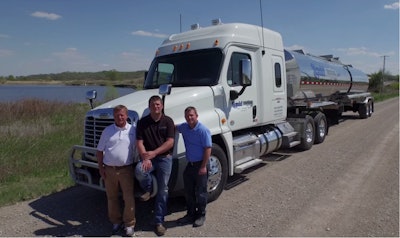 Roger Schmidt (left) founded the company in 1989. His son Gabe (middle) is director of operations and Josh Schmidt (right) is general manager.
Roger Schmidt (left) founded the company in 1989. His son Gabe (middle) is director of operations and Josh Schmidt (right) is general manager.Beins had transportation and logistics experience at a global agriculture and food manufacturer, and Schmidt had expertise in managing equipment. Together they grew the tank line business from the ground up.
A pivotal moment in the business came in the early 2000s during a mad cow disease outbreak in Europe. The disease created a scare in the United States and shippers required carriers to washout trailers before they would load animal feed.
This event caused Schmidt to research trailer wash facilities. He drove to locations nationwide before starting construction on a state-of-the-art wash bay south of Omaha near the Missouri River in Plattsmouth, Neb.
The wash facility has a steam boiler, high-speed spinner and other tools and equipment. It is Kosher certified and has washouts for all food-grade and feed-grade commodities, chemicals and hazardous materials. OFC/Schmidt Liquid Services also built an onsite wastewater treatment plant.
Responding to crisis
Like most carriers, management of Liquid Trucking put in place new procedures to protect employees from COVID-19. Starting March 14, the company’s office and shop doors were locked to restrict access to only employees whose jobs cannot be done at home, such as mechanics, drivers, the tank wash team and a handful of dispatchers.
 Jason Eisenmann, director of human resources, led the development of DeliveRecon, a mobile app that drivers use to optimize their work.
Jason Eisenmann, director of human resources, led the development of DeliveRecon, a mobile app that drivers use to optimize their work.All other employees work remotely. Additional steps to prevent contagion include setting up exterior handwashing stations and portable toilets, installing plexiglass around office cubicles and enforcing the 6-foot social distancing rule.
So far, disruption from the COVID-19 crisis has been minimal compared to a larger crisis that happened one year ago. In mid-March of 2019, heavy rains in Nebraska and other Midwestern states caused flooding of the Missouri River and its tributaries.
Liquid Trucking had 12 hours to prepare for the imminent flooding of its headquarters. The property remained under water for several days and reached 10 feet deep in some areas.
As president, Roger Schmidt said everyone at Liquid Trucking pitched in and did whatever was necessary. He describes the company’s management structure as flat whenever things need to be done quickly.
“We all kind of throw our gear on and do what we’ve got to do. Everybody gets involved, and it is really transparent to employees and everyone around us,” he said. “We know when a big problem happens that we have to go out here like warriors and do what we have to do to shore up the ship. It’s kind of a team effort, and everybody from the guy sweeping floor to the top gets involved. I’ll do anything that everybody else will do.”
Just as employees pitched in to help the company emerge from the flood, Josh Schmidt said they have all “been out there working their tail off” to keep the business running during the COVID-19 crisis.
Early adopter of hourly pay
Before and after the final electronic logging device (ELD) mandate on December 16, 2019, motor carriers have been adjusting their mileage-based driver pay structures to account for non-driving activities.
During the COVID-19 crisis, driver time has become more valuable as carriers have been seeing detention times increase.
Liquid Trucking has been using electronic logs since 2010 and quickly saw an opportunity to use the technology to create an hourly pay system that would motivate drivers to be more conscientious of speeds.
The pay program is performance-based and starts at $23.75 an hour. Drivers who have higher performance in the measurement areas of fuel, revenue and safety can earn up to $3 extra per hour after their first 13 weeks.
“We feel like we are rewarding the right areas,” said Josh Schmidt, who credits the pay program for being able to attract and retain higher caliber drivers.
During the past five years, the company’s driver retention rate has improved by more than 50%. In addition to the hourly pay structure, Liquid Trucking has utilized driver surveys from Stay Metrics to identify a myriad of improvement opportunities.
Liquid Trucking uses the results from the annual Driver Satisfaction Survey, for example, to help dispatchers improve their skills. Dispatchers see how they rank in important areas by drivers, said Jason Eisenmann, director of human resources.
Driver reconnaissance
As a tanker and hazmat carrier, drivers at Liquid Trucking have to follow strict procedures to avoid accidents and spills. Getting drivers accurate information in a timely manner — like where to turn, what to avoid, who to ask for and what numbers to call at each customer site — had always been a challenge.
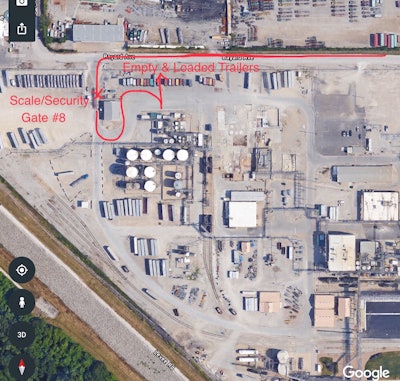 By using the DeliveRecon mobile app, drivers for Liquid Trucking update information on customer sites.
By using the DeliveRecon mobile app, drivers for Liquid Trucking update information on customer sites.After looking at different products in the market, management decided to invest in developing an app that would allow drivers to share location intelligence for the thousands of different locations its drivers go to each year.
In 2016, the new DeliveRecon app was released as an all-in-one mobile app and cloud platform that optimizes driver workflow at pickup and delivery sites. Overall, the app gets about 116 different location updates by drivers every month, Eisenmann says. Liquid Trucking rewards drivers for their reconnaissance efforts.
The company uses a custom-branded online rewards platform from Stay Metrics and created a reward category for DeliveRecon updates, adding to its other reward categories based on measurable data for safety, customer service, training and more.
Over the last four years, about 1.5 million points have been awarded to drivers for their DeliveRecon updates. Each point is worth half-a-cent, and the $75,000 spent has been well worthwhile to improve data for all locations, Josh Schmidt said.
During the COVID-19 crisis, management has seen an influx of changes to locations, such as posters, banners and handmade signs with delivery instructions, noted Eisenmann.
Liquid Trucking continues to look for areas to invest in technology that will make business more efficient so it can pay drivers more and make their lives easier, said Josh Schmidt. “We are not afraid to try new ideas.”
Despite the COVID-19 situation causing disruption in transportation and many other areas of the economy, Liquid Trucking sees growth opportunities. When this economy starts to fire back up, which may not happen until the fourth quarter, “we believe it is going to have a huge bounce back, and we want to be ready when that happens,” he said.
Editor’s note: Beginning in May, management of Liquid Trucking will provide CCJ with a monthly guest column about how its strategies have been working during the crisis and positioning it to accelerate growth when the economy rebounds.


